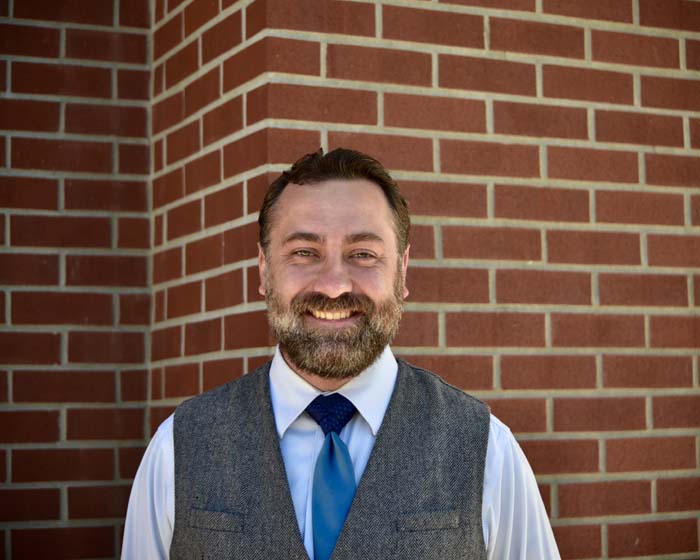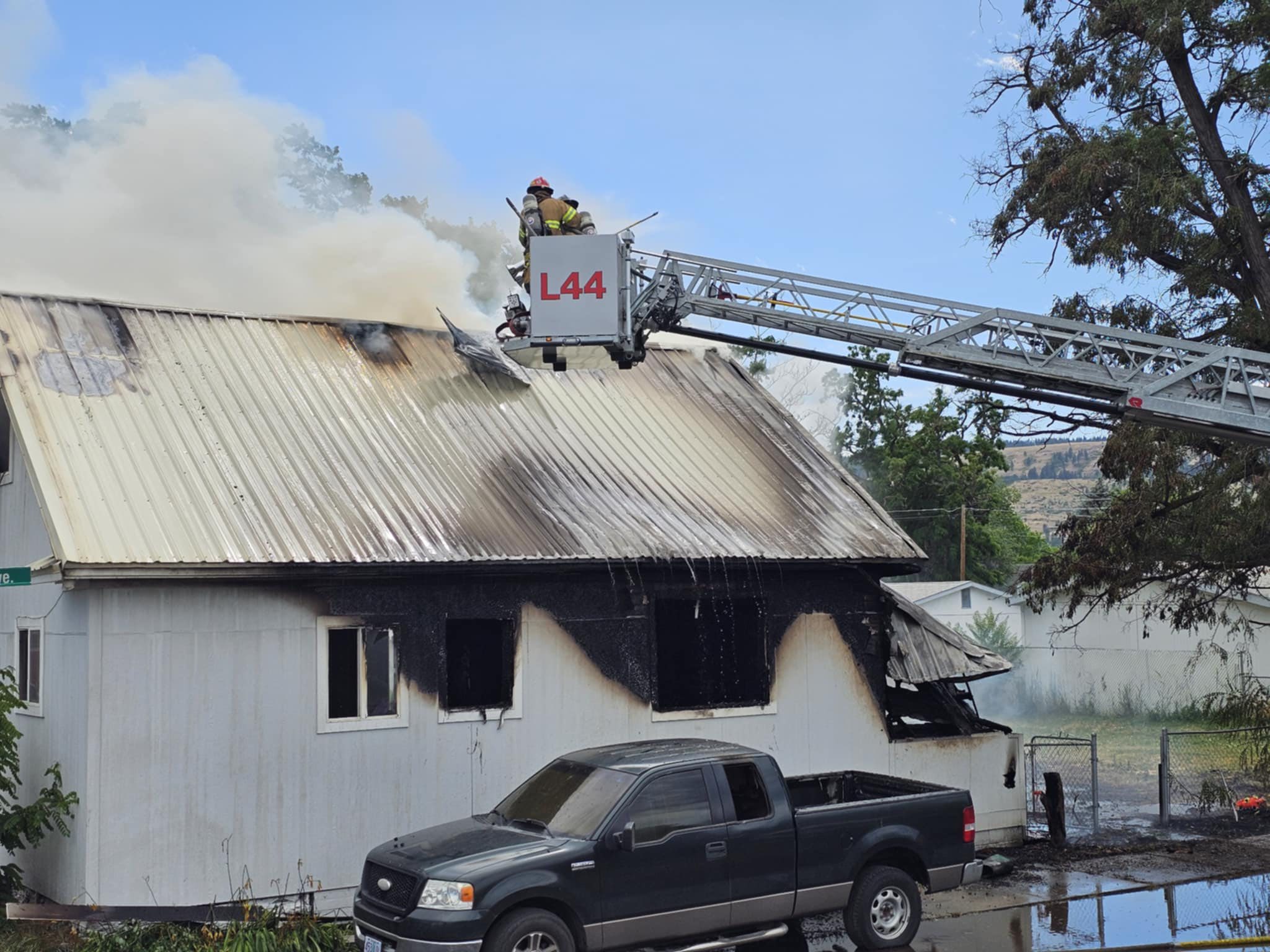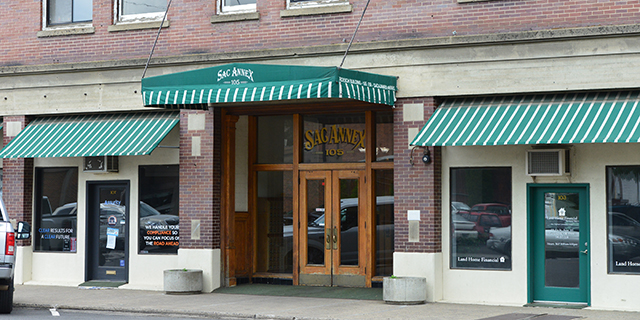A question of ‘timely justice’: Workload division emerges as key issue in judicial race
Published 8:00 am Saturday, May 4, 2024

- Boyd
LA GRANDE — Is the workload in the 10th Judicial District divided fairly between its two judges?
The question has emerged as a key issue in the campaign between incumbent Wes Williams and challenger Jared Boyd.
District attorneys in Union and Wallowa counties, saying they don’t believe they can get fair hearings or trials from Williams, have been disqualifying the judge from hearing criminal cases since 2020. That means criminal cases filed in the 10th District must be heard either by Thomas Powers, the presiding judge, or by another judge brought in from outside the district.
How that affects the workload between Powers and Williams depends on who you ask.
Williams says that, in part, because most cases filed aren’t criminal, he’s able to tackle his fair share of cases. He also says he expects to challenge the blanket disqualifications filed by prosecutors if he wins reelection — and that if he wins that challenge, he’ll be able to resume hearing criminal cases.
But Boyd says when you take another look at the number of hearings each judge handles, Powers is bearing the bulk of the workload — and that the disparity is beginning to put a strain on the workings of the 10th District.
To some extent, it’s a question of how you look at the numbers.
What the numbers say
In 2023, 4,197 cases were filed in the 10th Judicial Circuit Court — with 3,440 cases filed in Union County and 757 cases in Wallowa County, according to data from the Oregon Judicial Department.
In the same year, 874 cases were flagged as having a conflict for Williams, meaning he could not hear them.
Subtracting those cases from the total filed means that Williams, in theory, was able to hear 3,323 — or 79.2% — of the total cases filed in 2023.
“The majority of cases filed in Union and Wallowa County are noncriminal cases,” Williams said.
Another way to examine the numbers is to look at the amount of cases that required a hearing of some type before a judge. (Many of the cases filed in the district don’t require a judge’s attention.)
In 2023, there were 5,179 hearings in the 10th Judicial Circuit District — with 4,349 of those being in Union County and 830 in Wallowa County, according to the Judicial Department data.
Of these 5,179 hearings, Williams was flagged as having a judicial conflict on 3,889 of them — with 3,296 and 593 conflicts in Union and Wallowa counties, respectively. Powers had a judicial conflict on 82.
Cases are flagged anytime judges have a conflict — this can be due to disqualifications or because judges have recused themselves for any of a variety of reasons; they might know parties in a case, for example.
In 2023, Powers handled 3,342 of the hearings in the district, according to the data. Williams handled 673, and visiting judges covered 1,164 hearings.
There are a variety of reasons why visiting judges are used, according to Michelle Leonard, the trial court administrator for the 10th Judicial District. Judge trades — where two judges swap counties — are common in Eastern Oregon and something Leonard said has been happening throughout the 30 years she’s worked for the 10th District. She explained that smaller districts are likely to have more conflicts — for example, judges are more likely to know some of the parties in any particular case.
Other times, when trades aren’t possible, Leonard will request assistance from Salem to help cover a docket and there will be three judges in the district. Visiting judges are also brought in when a judge is on vacation.
Leonard said there’s a difference between cases filed and cases that take up time on the docket. For example, a number of cases default and never go to a hearing.
“There’s a great percentage of cases filed that never make it even to needing a hearing,” she said. “A case filed is not a case heard.”
Leonard said that while criminal cases take up more time on the docket, there are situations in civil cases that can lead to lengthy hearings.
“Each case brings its own dynamics,” she said.
That being said, Leonard stated that criminal cases as a whole require more time because they have to go to court, which doesn’t necessarily happen in other cases.
“There’s no way you can file a criminal case here that doesn’t have to go to court,” she said.
Criminal cases at minimum need three hearings — an arraignment, a plea hearing and a plea and sentencing hearing, according to Tina Routt, criminal case and courtroom supervisor. While many cases play out this way, others require more hearings, such as pretrial hearings, motions to modify release or motions on the evidence.
“The majority are probably a minimum of five,” Routt said.
But some cases don’t require that many hearings. For example, driving under the influence diversions usually take two hearings, and violations that come through a district attorney’s office can often be resolved in the first hearing.
“In the grand scheme of things, civil cases are more likely to go away,” Leonard said. “Which means something settles.”
Williams’ view
Williams notes that the noncriminal docket in the district is about 80% of the caseload.
And, he said, it’s misleading to equate the number of hearings judges oversee with the amount of cases they handle. Judges’ duties are not only limited to the work they do from the bench, he said. Much of a judge’s work takes place outside of the courtroom.
“There’s a huge amount of noncriminal paperwork and decisions that a judge who handles the civil docket must take care of that never involve a hearing,” he said. “All of that happens in chambers and takes hours and hours of judge time. But it never involves a court hearing.”
Williams added that while civil cases tend to involve fewer hearings, those hearings have a tendency to take longer and are “more intense.”
As an example, Williams pointed to his day on Friday, April 26. He was assigned one hearing — a custody case that involved parenting time — that took all day. In between hearing evidence in the custody case, Williams said he also handled an emergency hearing for a restraining order.
In the custody case, Williams said he now will have to determine who should have custody and what the parenting-time plan should be. Williams will review his notes, listen back through the testimony and research the law.
That whole process may take anywhere from one to eight hours, Williams said.
“The civil docket involves so much research and deliberation outside of the courtroom,” he said.
Williams also argues that focusing on the number of hearings alone is misleading because there are a number of instances in civil cases — such as with traffic violations, guardianships, conservatorships and probate — where matters are handled in chambers and without the need for a hearing.
“What my opponent is doing is comparing apples to oranges,” he said.
In fact, Williams said he views the workload issue as a “red herring.”
Boyd, Williams said, “can’t argue my record. I’ve got a near-perfect record. He can’t argue my experience. My experience is vastly superior. There’s no comparison between my experience and my opponent’s experience. He’s … got to argue: ‘He can’t hear cases, he can’t hear criminal cases, so don’t reelect him.’”
Williams said that during his time as a judge he has not been appealed by a single prosecutor.
He’s been reversed only once in a criminal decision, he said — after a defense attorney appealed his decision for giving a defendant too much community service. Williams now recognizes that he made the wrong decision and has learned from the mistake.
On the civil side, Williams said he has been appealed, but his decisions have been affirmed by the Oregon Court of Appeals every time.
Williams said there seems to be a misimpression that the presiding judge, Powers, is overworked. He added that if that were true, there were a number of cases that Powers could have assigned to Williams.
Boyd’s view
Boyd, a defense attorney in La Grande who frequently also practices in Wallowa County, sees what’s happening in the 10th Judicial District differently than the incumbent.
“We have two judge positions, and one judge (Powers) is handling the overwhelming amount of cases and complex cases,” he said.
Boyd points to the disparity in the total number of hearings handled by Powers, the district’s presiding judge, and Williams. However, Boyd believes that it’s not just the number of hearings that need to be considered, but the type of hearings.
He thinks the cases that Power handles generally are more complex.
“Judges are there to issue judgments and opinions, and you typically don’t do that without a hearing,” Boyd said.
“There’s no comparison here,” he added, “and Judge Powers is completely overwhelmed.”
The workload disparity is beginning to create what he called a “bottleneck” in the 10th Judicial District.
“The court staff and judges have done what they can holding the system together with shoestrings and duct tape,” he said. “But we are approaching a breaking point where I don’t know what’s going to happen … and I don’t think we want to see that as a community.”
He’s especially concerned with the impact of the legislative decision to recriminalize drug possession in certain cases. No one is certain yet what shape that process will take in Union and Wallowa counties, but Boyd said it’s possible that it will add substantially to the judicial workload: “We’re going to have more hearings, more supervision, more violations. That’s just reality.”
Boyd raised eyebrows in the legal community around the state when he filed for the seat in 2023 and said he intended to self-finance his campaign.
He said he personally felt uncomfortable accepting campaign donations — particularly from other lawyers who may wind up trying a case in his court. Would he feel that he had to recuse himself from a case with a lawyer who was a major donor?
“I just couldn’t square that,” Boyd said, “especially in this context, where a key issue was a judge not being able to hear cases.”
He emphasized that there are no rules — legal or ethical — barring judges from taking contributions from any member of the public.
“I just feel this is the choice for me,” he said. “And at the end of the day, I’m comfortable with my decision.”
Powers weighs in
Powers explained that handling case assignments is one of the statutory duties of the presiding judge in a district with more than one judge. Sometimes he will assign himself a case because he is already handling a related matter.
For example, Powers said, he might be handling a domestic violence assault case. The victim in that case may then come into court asking for a restraining order against the defendant. In that situation, Powers would assign the restraining order case to himself as well.
The goal, he said, is to provide consistency to all of the parties involved.
Powers said that those kinds of scenarios could also easily go the other way. For example, Williams may be handling a divorce case and one of the parties asks for a restraining order. In that instance, he would assign the second case to Williams.
“I would rather that the people who come into court get consistency in their cases, even if it means making changes to our caseload. We’re there to serve the public, and whether it’s Judge Williams taking an extra case to ensure consistency between the parties or me taking an extra one to give parties their fair shake in court, I’m happy to do that,” he said.
Powers also agrees that simply looking at the number of hearings doesn’t show the full picture of what a judge is handling. For instance, the 3,342 hearings Powers heard in 2023 doesn’t include the work he handles within the specialty court programs — Union County Drug Treatment Court, Union County Behavioral Health Court and Wallowa County Drug Treatment Court.
Each of the treatment courts meets one day a week. Depending on the number of participants in each program the time commitment varies, but typically the programs require anywhere from an hour to two and a half hours.
Powers takes pride in the success of 10th District speciality court programs.
“I’m really committed to learning about the participants and figuring out what will help motivate them, what will help them succeed. And the investment of time, energy and emotional energy into those specialty courts is a huge, huge part of my work every week,” he said.
Under strain
Powers would like to shift the conversation away from the numbers and the percentages.
“My concern is just that bottom line of making sure that people who come into court get their cases resolved in a timely manner,” said Powers. And, he said, his concern about that is growing.
Powers said that while court staff are managing the docket and assigning cases to one courtroom or another, overall cases are taking longer to get resolved. This impacts everyone involved in criminal cases — from defendants and public defense attorneys to law enforcement and prosecutors to victims and their families.
“That’s what the signs of stress and strain on the system are,” Powers said. “Cases taking longer to resolve, a backlog of cases that affects everybody who participates in the court system, and ultimately a community that has to question: ‘Are we getting timely justice from our court system?’”
[EDITOR’S NOTE: This story has been changed to reflect a correction. The story included an incorrect stipulation about the data looking at the number of hearings in 2023. There were a total of 5,179 hearings in the 10th Judicial Circuit District.]
Online
To read a copy of the 31-page affidavit outlining Union County District Attorney Kelsie McDaniel’s reasoning for disqualifying Judge Wes Williams, log on to lagrandeobserver.com.
Editor’s Note: This is the second in a two-part series about the 10th Judicial District and the election contest between Judge Wes Williams and challenger Jared Boyd.
Age: 40
Occupation: Attorney — a solo practitioner in La Grande and frequently works on cases in Wallowa County
Background: Boyd was a political science major; his father was a county commissioner and Boyd worked on some of his campaigns. Boyd graduated from Willamette University School of Law in 2008. His first job out of law school was working in the Union County District Attorney’s Office.
“One of the reasons I really loved moving to a small town and working for a small-town DA’s office is you get a lot of experience very quickly,” he said.
He worked on major methamphetamine cases and cases involving white supremacists. In 2015, he opened his own solo firm and has done primarily defense work since then. “But I also do a little bit of everything else.”
Family: Boyd and his wife, Jill, have two children.
Why are you running? First, Boyd said, “we need a functioning judicial system and right now I just don’t think we have one with the current situation.” In addition, after 15 years as an advocate, Boyd finds the idea of being a dispassionate adjudicator appealing: “You’re there to call balls and strikes and to do it fairly.”
Biggest issues facing the district: “I think overall, the 10th Judicial District is struggling with resources,” he said, adding that the demands of the new law making certain levels of drug possession illegal again likely will increase the strain.
A lack of community resources — particularly with mental health — also impacts the court system, he said. But the new law has had a positive impact in bringing together a number of stakeholders to discuss possible solutions. Boyd said his experience as a prosecutor and a defense attorney give him unique qualifications to contribute to those discussions.
Age: 63
Occupation: Judge in the 10th Judicial Circuit Court
Background: Before entering the University of Oregon School of Law, Williams taught classes in U.S. history, law and justice and geography at Sandy High School.
“It took me seven years to save up enough money to go to law school,” he said.
He moved to La Grande shortly after graduating from law school and opened a law practice in 1996. “I did everything from drafting wills to trying murder cases. I practiced in virtually every court in Oregon.”
He was elected to the 10th Circuit bench in 2018.
Family: Williams and his wife, Jennifer, have two children.
Why are you running? “I’m running for reelection for really the same reasons I ran for election in the first place,” he said. “I strongly believe that we need a court system where the judge listens to people patiently and respectfully and treats all people equally before the law.”
Biggest issues facing the district: Williams said the top issue facing the district involves the disqualifications filed against him by district attorneys in Union and Wallowa counties; as a result, Williams has been barred from overseeing criminal cases. Williams said voters elected him to hear every type of case, including criminal, and said he plans to challenge the disqualifications if reelected.
The second issue, he said, is ensuring that people involved in a court case feel that the judge has heard their voices and that they have been treated with respect.
Age: 63
Occupation: Presiding judge of the 10th Judicial Circuit Court
Background: Powers attended law school in Portland and was admitted to the bar in 1998. He started his career doing civil practice, primarily related to medical devices and pharmaceutical litigation on the plaintiff side.
Powers and his family moved to Joseph in 2011. He opened his solo practice in 2013 where he handled “anything that came in through the door.” Powers was with the Oregon Department of Justice for seven months in 2016 working on the Volkswagen diesel litigation. He was the Lead Assistant Attorney General for Oregon and served on the national Attorney General steering committee on the Volkswagen litigation.
Powers was appointed to the 10th Judicial Circuit Court in 2016 and then ran unopposed for the position in 2018.
Family: Powers, and his wife, Ann, have two children.
Why are you running?: “I want people to vote for me because I hope they understand the work that the court has done in the last seven years, not just with my work on the bench, making decisions in individual cases, but as presiding judge,” Powers said.
As the presiding judge, Powers is responsible for the court’s interaction with the community. He is proud of the way community members have come together to partner with stakeholders within the court system, especially in connection with mental health and addiction.
Biggest issues facing the district?: Powers believes that the biggest issues facing the court system in Union and Wallowa counties are all interconnected. These issues are the drug crisis, substance abuse and mental health.









